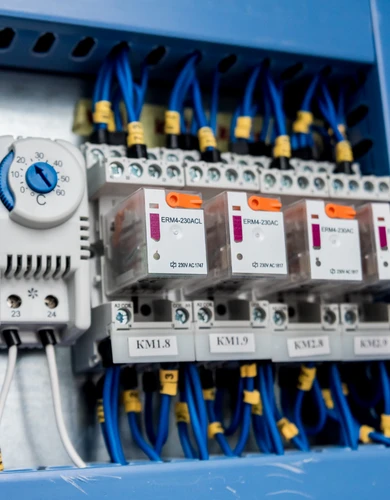Climate Change Levy for Businesses
The Climate Change Levy (CCL) is a UK tax on electricity and gas supplied to businesses, designed to encourage business energy efficiency and reduced greenhouse gas emissions.
In the past year, businesses paid a total of £1.8 billion in CCL charges. This guide explains how the levy works, the available exemptions and discounts, and ways to reduce CCL costs.
Contents
- Who pays the Climate Change Levy?
- Climate Change Levy rates
- How do businesses pay the Climate Change Levy?
- Exemptions for the Climate Change Levy
- Applying for a Climate Change Levy exemption
- Reduced rate of Climate Change Levy
- How to reduce Climate Change Levy costs
Who pays the Climate Change Levy?
The Climate Change Levy is paid by non-domestic properties that use energy through a connection to the local grid:
The CCL appears as a separate charge on energy bills, based on the rates below.
There are a few exceptions, which we explain in this guide:
- Homes, charities, and small business users are exempt.
- Discounts are available for energy-intensive businesses with a Climate Change Agreement.
💡 The Climate Change Levy also applies to LPG and coal deliveries; however, this article focuses on its impact on electricity and gas supplies.
Climate Change Levy rates
The table below shows the Climate Change Levy rates from 1 April 2024 to 31 March 2026.
| Business Energy Supplies | Rate (pence per kWh) |
|---|---|
| Electricity | 0.775 |
| Gas | 0.775 |
Source: Gov.uk – Climate Change Levy Rates
The CCL rates above apply to all types of business energy tariffs, including green business energy or renewable tariffs.
💡 In its recent budget, Labour announced that the Climate Change Levy will increase from 1 April 2026 in line with inflation.
Receipts from the CCL are not earmarked for environmental projects but instead go directly into general treasury pool and is used for a wide range of public expenditure.
How do businesses pay the Climate Change Levy?
As part of their Ofgem licence, commercial electricity and business gas suppliers must collect the Climate Change Levy from their business customers.
Suppliers calculate the CCL based on the rates above and the energy consumption of their customers, as measured by meter readings. The CCL typically appears as a separate line on commercial gas and business electricity bills.
Licensed suppliers are responsible for paying the Climate Change Levy they collect to HMRC.
Unlike VAT, businesses are not required to collect the Climate Change Levy or pay it directly to HMRC.
Exemptions for the Climate Change Levy
Three main exemptions exist from paying the Climate Change Levy on commercial gas and business electricity prices:
These exemptions align with the criteria for the reduced rate of VAT on business energy bills.
Domestic customers
Households do not pay the Climate Change Levy. For mixed-use properties where 60% or more of the energy is used domestically, the property is treated as entirely exempt from the CCL.
Small business energy users
Individual supplies to small business energy users are exempt from the CCL as long as annual business energy consumption is less than:
- 12,000 kWh of electricity per year
- 52,765 kWh of gas per year.
Charities
Electricity and gas supplies used by charities for non-business purposes, such as education, religion, and nature conservation, are exempt from paying the CCL on commercial electricity and business gas prices.
Applying for a Climate Change Levy exemption
Typically, business energy suppliers automatically include the CCL on electricity and gas bills.
If your business meets the domestic, small usage, or charity criteria mentioned above, we recommend applying for a reduced rate of VAT with your energy supplier. This will eliminate the CCL charges on your commercial electricity and business gas bills.
For other types of relief or discounts on the CCL (see full list here) you can file for relief using the following forms:
- PP10 – CCL Relief supporting analysis – Submitted to HMRC to support your relief from the CCL.
- PP11 – Claim relief from the main rates of CCL – Submitted to your business energy supplier.
Reduced rate of Climate Change Levy
Energy-intensive industries can benefit from a discount on the Climate Change Levy by obtaining a Climate Change Agreement from the Environment Agency.
The CCL discount for holding a Climate Change Agreement is currently 92% on electricity and 89% on gas.
Under a Climate Change Agreement, a specific industrial facility agrees to measure carbon dioxide emissions and target significant reductions each year. As long as the facility meets its carbon-reduction targets, it will continue to receive a discount on the CCL rates.
According to the Environment Agency’s public register, 8,849 UK facilities hold a Climate Change Agreement.
How to reduce Climate Change Levy costs
The Climate Change Levy incentivises businesses to use energy more efficiently, reducing overall demand and greenhouse gas emissions.
Businesses can reduce or avoid paying the Climate Change Levy by taking any of the following steps:
- Invest in energy-saving equipment and technologies.
- Conduct a commercial energy audit to identify and apply opportunities to reduce energy consumption.
- Generate their own renewable electricity to reduce reliance on grid power.
- Enter into Climate Change Agreements.

